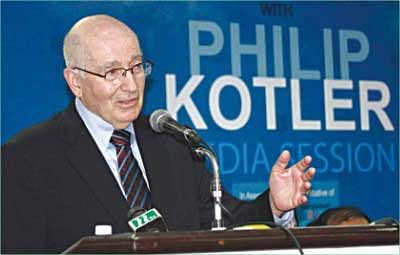Marketing: a paradigm shift in the offing

Professor Philip Kotler, the most influential marketer, has masterminded the World Marketing Summit that begins in Dhaka on March 1. Photo: STAR
The profession of marketing has been reduced to the new age equivalent of quackery in the eyes of the general population. According to a proprietary study done by Yankelovich Partners, marketing has a negative connotation attached to it by the general population. Average Joe is more likely to associate marketers with unwanted spam filling their mailbox and annoying telemarketers interrupting family dinners than key players in organisational growth.
Marketers themselves are somewhat to blame for inciting this level of customer resistance. At any given point of time, consumers are bombarded with TV ads, internet ads, spam mails, intrusive ads, annoying telemarketing campaigns and countless other forms invading the targeted consumer's space. It is little wonder that the current generation has a five-second attention span considering they are being hammered with as many ads within that period of time. Unscrupulous strategies such as planned obsolescence, dumping, high pressure selling, bait and switch tactics and deceptive pricing have not helped the cause either.
The Machiavellian concept of most marketers to do whatever it takes to maximise shareholder wealth has lead to a view of marketers being further associated as people who prey on weaknesses and fears. Within the organisation there is constant scepticism on whether it is a valid profession or the domain of self important charlatans with flexible morals. Marketers are themselves in constant internal strife as to whether marketing should be a fundamental strategic part of organisational growth or a customer facing function.
While some of the negative press on marketing is deserved, it is not all gloom and doom. Modern marketing at the heart of it focuses on stakeholder wants and needs and attempts to fulfil them. The rise of capitalism and free market economies can largely be attributed to successful and effective marketing. The hard truth of the matter is marketing works and works very well. Furthermore much of the negative connotations associated with marketing are largely due to hard sell campaigns and the delivery channels marketing messages disseminated through and little to do with most modern marketing approaches and strategies.
Modern organisations have realised that they need to move away from the concept of just shareholder profit maximisation towards the maximisation of stakeholder benefits. As a key stakeholder customers have moved on from being a means to an end to a key value driver in the eyes of a marketer. Large organisations like Apple have moved on to a customer centric model and it has paid large dividends. Increasingly companies have resorted to creative yet strategically targeted campaigns that involve the general population using guerilla marketing, crowd sourcing and viral marketing and other innovative solutions. Most of these campaigns have been operated on a shoe string budget and have been able to capture the attention span of an increasingly fickle consumer base.
The future of marketing is likely to bank on the power of social media and increasingly more creative ways of engaging the consumer without being overly intrusive. The consumer, which has already been acknowledged as an all-important value driver for the organisation, is likely to be more and more involved and made part of an organisation's marketing campaign and strategy.
Social marketing takes the people centric view of modern marketers one step further by taking a cue from marketing's core value of identifying human wants and needs and attempting to apply that to achieve specific behavioral goals for human good. Social marketing began as a formal discipline in 1971 with the publication of "Social Marketing: An Approach to Planned Social Change" in the Journal of Marketing by marketing experts Philip Kotler and Gerald Zaltman.
The World Marketing Summit aims to take the concept of social marketing one step further by providing a platform for the world's best marketers to get together and provide solutions to some of the world's most pressing problems. World Marketing Summit (WMS) is an initiative of World's most influential marketer Professor Philip Kotler with the mission of creating a Better World through Marketing. Through strategic partners, WMS intends to bring about a monumental shift in social marketing and bring it to the forefront of development work. Professor Kotler, with representatives from Canada and Bangladesh and the support of the government of Bangladesh, has been encouraged to embark on this journey in 2012. Although primarily designed to target the bottom of the pyramid (poorest four billion people in the world) the summit will also attempt to solve the problems that plague developed nations.
The WMS will not only provide a platform for marketing's best thinkers to share their views but also will serve to connect research hubs (aptly dubbed incubators as they will be hubs where ideas will be formulated and hatched) which will implement the ideas and models that are shared at the summit. This novel concept ensures that the ideas generated at the summit do not die as soon as they are conceived rather they are implemented and monitored to verify if they are successful.
The summit will take place on March 1-3 in Dhaka at Bangabandhu International Conference Centre. More than 60 speakers including heads of state, marketing gurus and other prominent global personalities will take center stage at the summit. It will also feature 10 incubator plenary sessions, 12 general plenary sessions, 10 CEO roundtables and a Local & Global Marketing Best Practices Experience Zone.
The days of marketing being associated with quackery may indeed be over as it is poised now to make strides not only in organisational growth but in the development of the world. Recognised as one of the key drivers of organisational growth, marketing is now poised to be one of the driving forces of global change.

 For all latest news, follow The Daily Star's Google News channel.
For all latest news, follow The Daily Star's Google News channel. 




Comments